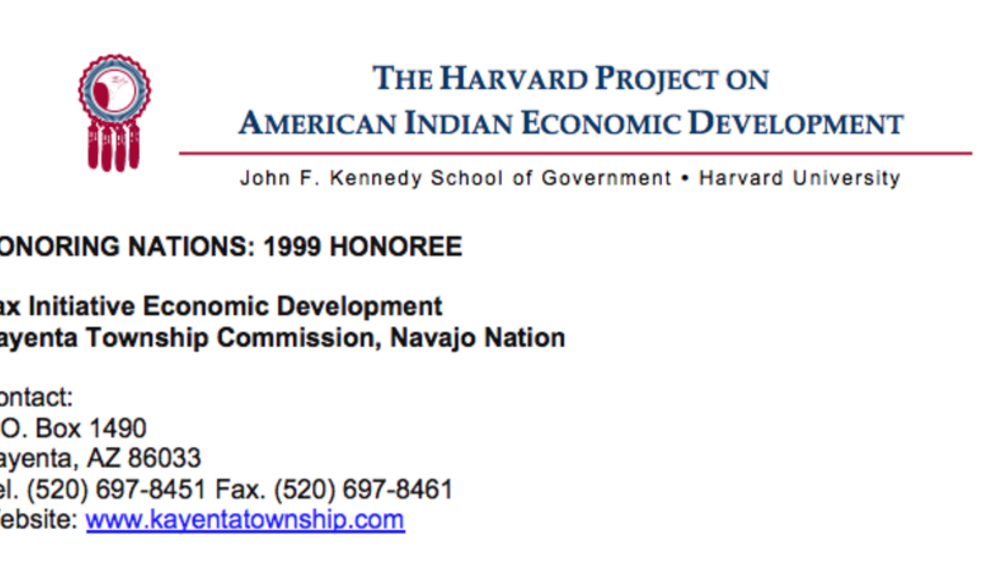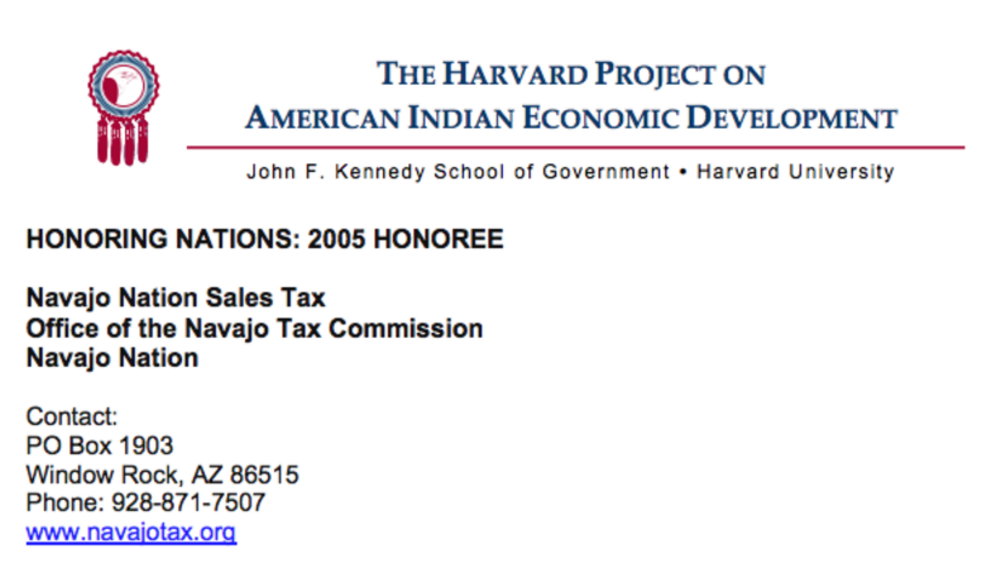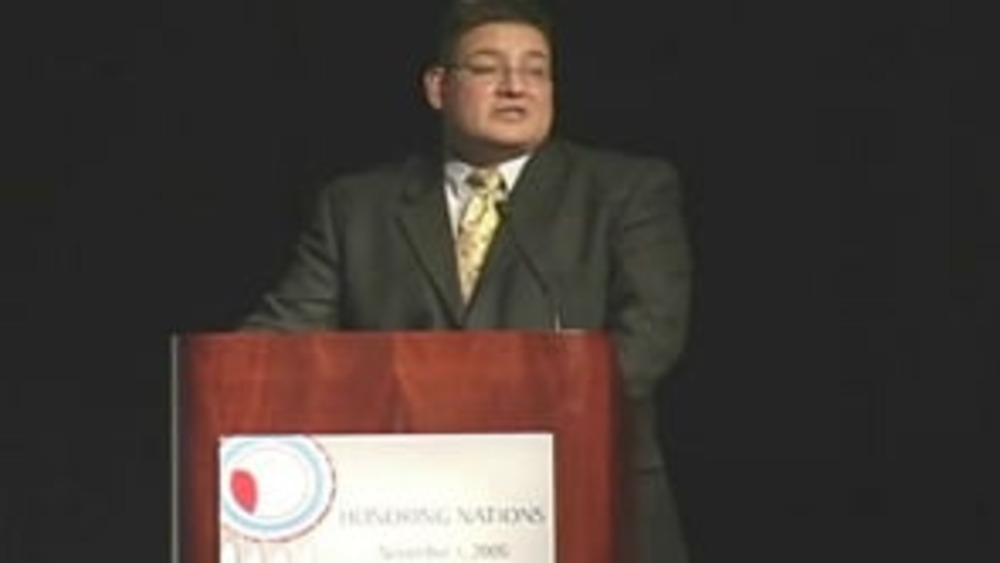Mary Etsitty, Former Executive Director of the Office of the Navajo Tax Commission, discusses how and why the Navajo Nation sales tax was established, and how the Office of the Navajo Tax Commission works to consult and educate Navajo citizens about the need for -- and benefits of -- generating governmental revenue through a sales tax.
Additional Information
Etsitty, Mary. "The Navajo Nations Sales Tax." Honoring Nations symposium. Harvard Project on American Indian Economic Development, John F. Kennedy School of Government, Harvard University. Cambridge, Massachusetts. September 27-28, 2007. Presentation.
Transcript
Michael Lipsky:
"And our final speaker will be Mary Etsitty, the Executive Director of the Office of the Navajo Tax Commission."
Mary Etsitty:
"Yá'át'ééh. Good morning. My name is Mary Etsitty and I'm Diné from the Navajo Nation. So, greetings from Navajo land. I'm actually from Arizona; the Navajo Nation is also partly in New Mexico and Utah. I'm here today as a representative from the Office of the Navajo Tax Commission. In 2005, we were an honoree from the Honoring Nations and [I'd] just like to thank the committee here again for that honor. It was very special to us and I'd like to thank Amy [Besaw Medford] for inviting me to be here today. This is a very wonderful experience.
We were given our award in 2005 because of our sales tax. The Navajo Nation has actually had taxes for many years. Back in the 1970s is when we initiated our tax program. We were not successful in collecting taxes until about 1985 when we had a Supreme Court case, Kerr McGee vs. the Navajo Nation. So ever since 1985 our office has just been going full force in collecting taxes. Last year, we collected a total of $85 million for the year, and although the overall budget of the Navajo Nation is greater than that, we're just striving to get to the point where we are basically sustaining ourselves. We do have seven taxes right now. Our original five taxes are based almost solely on the natural-resource industry because Navajo Land has coal mines, we have oil and gas leases, we have pipeline property, we have electric generation, and we collect a lot of money in royalties and taxes from that type of industry. But what happened in the late 90s is, we had a leader at the time whose name was Kelsey Begaye, and he was kind of looking into the future for us. And he said, ‘You know, we're not always going to be able to sustain ourselves on natural resources so we need to look at other areas for generating revenue.' So he encouraged our office to start looking into some other taxes, and that's when we looked into fuel excise tax and the sales tax.
We have actually always been taxed on fuel except before 1999, the states of Arizona, Utah, New Mexico were collecting those taxes and it was not coming back to the Navajo Nation. So we adopted our fuel excise tax and there's a credit we have against the states. So we collect our own money on the Navajo Nation and the states, in some circumstances, they give us refunds. We kind of work it all out with them and we have very good relations with the states at this point. And so that was our fuel excise tax. And then right after that was our sales tax that we initiated. And with these two most recent taxes, the leaders within Navajo, they knew that what was going to happen, ultimately, is these taxes -- fuel, excise and sales tax -- were eventually going to come down to the Navajo people. Although technically legally the burden is not on the buyers, that's how our sales tax is set up. It's on the sellers, and for the fuel it's on the distributors, but they do ultimately pass it down to the consumers, the Navajo people.
And so our leaders back in this time thought, ‘We need to know what the Navajo people think.' And actually, the executive director of our office, at the time, kind of foresaw this as well and he -- just from the beginning of our fuel excise tax and our sales tax -- he sent us all out. I was working as a staff in the office at the time and he literally sent all of us out into the field. The Navajo Nation is approximately 27,000 square feet; it's a very big reservation. Oh, I'm sorry. I always say that. I'm sorry. I always say square feet. [27,000] square miles. Anyway, so we're pretty big. And there's only like 20 of us in the office and so we all get sent out to talk to the public, to hold these public forums, and find out what the Navajo people think about taxes; and so we did this for our fuel tax, and then later on, for our sales tax. And what we found out was that, within Navajo land, many of the people were in favor of being taxed. They really didn't mind. They said, ‘I think we should contribute to the government as long as we're going to benefit and our communities are going to get this money.' So it was actually kind of good to hear that from the people. Although, when we would talk to the business owners it was a little bit different. They were not real happy about it. But, in general, the people were. So that kind of helped us to move along our effort and keep pursuing the sales tax. And these public forums that we held helped us to structure our sales tax and it told us that we need to get the money back to the communities. That's what the Navajo people want.
And so what we did was -- we kind of compiled this report that said we went out and talked to as many Navajos as we could, as many people that live on the Navajo Nation, and they want the money to go back to their communities. So the executive director of Tax Commission at the time -- he's an attorney, also, so he was able to get all this legislation together and structured it so that the money that comes from retail establishments within the Navajo Nation will go back to that area. There's kind of some calculations that you have to go through but the money is there for the chapters. We call them chapters with the Navajo Nation because we are so big; we're split up into 110 chapters. Chapters are kind of like the local areas where people go to get information about the government. So the money does go back. And it's not real specific at this time how it gets spent, but it's supposed to be spent on government purposes. Another thing about our public forums is that I think, at the same time, Kayenta Township was also becoming very noticed because of their sales tax initiative. So I think people on Navajo Nation saw that as a very positive thing and so they were in favor of Navajo Nation sales tax. Our sales tax rate is at three, or it was at three percent for the first few years. And what we did was we studied the sales tax rates of the surrounding communities around the Navajo Nation and we kept our rate relatively low compared to some of the border towns around the Navajo Nation. And surprisingly, people on the Navajo Nation didn't really, it didn't really affect them when we started our sales tax. I would talk to people just in the public and ask them, is it changing your spending habits and they all said, 'No.'
Most recently, within the last year, our judicial committee from our legislative body decided that they needed more money to build more courts and more jails. So they said, 'Let's try to get some of the sales tax money.' And so what they proposed was to increase our rate to four percent and then to keep that additional, or to keep 25 percent of it, which would essentially be that extra one percent. And so the judicial committee, judicial and public safety committee, they wanted to do this. And so they brought it before the overall Navajo legislative body. And the first time they approached our council, our council said, ‘No, we need to know what the Navajo Nation people think. It's going to affect them, ultimately.' So they pretty much sent the judicial committee out to do what our office had done originally, which was go out and hold public forums and find out what the Navajo Nation people think. So within the last year, I assisted the judicial committee and the public safety committee and we essentially did the same thing. We scheduled forums at some of the chapters within the Navajo Nation and we met with residents and basically informed them of some of the needs of the judicial branch and the public safety branch of the Navajo Nation, and asked them what they thought about us increasing the rate and having that money go to those specific activities. And again, Navajo people were in favor of it. They said, 'Why not increase it [to] two percent instead of just one percent.' So they were again, they liked the idea. They said, 'As long as we know that our money is going to go to a good cause and it's going to help people in general, then we are for it.' So once we compiled all that information again, [we] went back to the overall legislative body and explained to them what we had found out by talking to the people. And then it passed. So as of July 1st of this year [2007], our sales tax rate is now four percent and that extra [one] percent is going into a special fund to supplement our judicial and public safety facilities.
As of right now, we really haven't gotten any negative feedback or negative comments on it so it's going very well. The way our sales tax is set up, it actually, we have a range that we can go between two and six percent. That's the way our sales tax statute is written. So I think in the future, we're probably going to have more offices and other legislators coming to us and saying, ‘Let's increase it some more.' As far as I know, right now, Navajo people are generally in favor of it. Their main concern is just, ‘Let's make sure the money is spent well.' That's one area that -- it's kind of out of the hands of my office, as far as how money is spent. We really just concentrate on generating revenue, bringing in revenue and making sure our taxpayers are filing and paying the correct amounts. But it would be very good overall for our government to show how tax money is being spent. So with our sales tax money, some of it does go back to the communities. And with our fuel tax, that all goes into a roads fund that the Navajo Nation Department of Transportation oversees. Again, people in general are in favor of that because they know where it's going, they see where it's going, and it's going to help them, ultimately.
So that's kind of the Office of Navajo Tax Commission's story of civic engagement. Is -- we kind of have no choice but to go out there and talk to people because people, in general, in Indian Country, they just are not familiar with taxes at all. I'm not sure, but I think Navajo Nation probably has one of the most extensive tribal tax programs at this time. We try to help out other communities and other tribes that want to set up their taxes. We've made it a point, ever since our sales tax, within my office, to go out and educate people, especially people on the Navajo Nation. Before our sales tax, a lot of people didn't even know that we had taxes because it never came down to them to pay anything. We've really been educating people. Every time we are asked to do a presentation, we go out and explain all of our taxes as much as we can.
One of the things that we've started doing also is, every year -- I'm not sure how it is here, but out in the west we have fairs, have rodeos and the whole big parade and all that stuff. So every year now, during fair season, we put together surveys and we go out and we talk with people and get information from them and try to educate them at the same time. A lot of them are very glad to hear what the Navajo Nation is doing as far as taxes. And again, a lot of them are in favor of it. That's always a good thing for us [because] we're used to being not really liked by business people. We're not always the most popular people at meetings and stuff like that. So that's what we've been doing and I just wanted to show -- this year what we did was we found this really cool promo item and it has our logo; we have a logo called Buy Navajo. And this is actually another interesting story. About three or four years ago, the Office of the Navajo Nation President sponsored a contest. The president said, ‘We need to have people spend their money on the Navajo Nation. Let's try to have people not spend so much in the border towns.' And so he said, ‘Let's make up this logo called Buy Navajo.' And he had a contest for someone to come up with a design for this logo. I think it was a young man out of Shiprock, New Mexico that came up with our logo, and it's basically a corn stalk. And unfortunately, this is really small for people to see, but it's a corn stalk and then it has the four sacred mountains that Navajos have in the southwest. So we promote the Buy Navajo campaign. We try to tell people, ‘It's important to spend your money on the Navajo Nation, buy your groceries, buy your gasoline on the Navajo Nation, because that tax revenue will stay on the Navajo Nation.' So that's another example of civic engagement. As our president said, ‘Let's get all the people involved in trying to come up with a design for us, for the Navajo people.' Oh, okay, I'm sorry. It's called a view-tainer. It's just a container, you can buy these at Home Depot and it's just a really cool-looking container to put stuff in. We kind of saw it like as a little piggy bank maybe and you can put change in it.
So this year at the big Navajo Nation Fair we had just a brief survey that we were doing and we were just asking people, ‘What's the Navajo Nation sales tax rate?' We want to know if people are current on their information and then we asked them, ‘What's the sales tax rate in the nearest border town?' And that would be Gallup, New Mexico, if you're in Window Rock. And then we asked them, ‘Where's the last place you shopped at? Where's the last place you bought your fuel?' And so right now we're compiling that information. It's just also to make people a little bit more aware of where they do shop and just make them aware of taxes in general. What we did was we just put our own information inside the view-tainer so when people filled out the survey we would give them the container and then inside it had some of the answers like to some of the sales tax rates of the surrounding cities, counties, states.
That's what we do to try to educate people because, even with the general United States population, there's a huge misconception that Native people do not pay federal income taxes. So I would just like to ask all of you to please try to talk to people and let them know that that's not true. I attend a lot of tax conferences, and even people that work in the tax industry, they have that misconception. It's all about educating as far as taxes are concerned. I thank you for listening to me and I think maybe taxes are kind of boring for some people but it's actually very interesting to some of us on Navajo land. So thank you."



